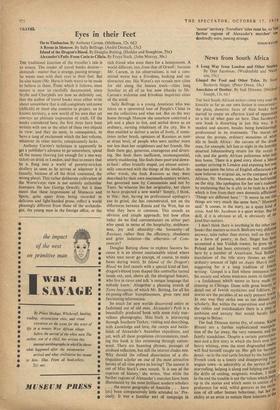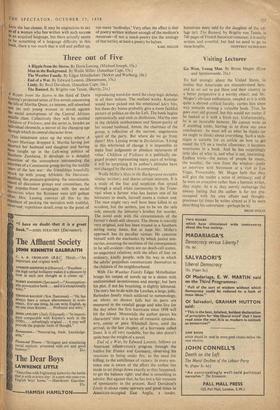News from South Africa
Gimpel the Fool and Other Tales. By Isaac Joseph, 13s. 6d.)
THE best South African writers come very near the knuckle as far as our own fiction is concerned the plain, domestic faces of their books have started to create an effective kind of opposition to a lot of what goes on here. Dan Jacobson's new book is disturbing in just this way. It is modest and sincere, besides being bewildetinglY professional in its treatments. The stories arc about the private, ordinary occasions of white life in South Africa : the carcass of the drunk man, for example, left late at night in the horribly deserted Johannesburg streets for the /son t° rob, and the gentle African policemen who take him home. There is a good story about a liberal mother arriving in London and exposing her sou' who has eaten the lotus of English affectation and now believes in original sin, to the company of all African, Mr. Manwera, whom she has befriended on the ship. She apologises for her son's rudeness by explaining that he is able to be rude in a place I which is free from their own domestic afflictions. `Things are different here.' "It seems to me that thingsare very much the same here," Manwera said.' It comes, in the story, as a quiet kind of I crisis. And Mr. Jacobson is a quiet writer. But his skill, if it is obvious at all, is obviously of tilt kind that matters.
I don't think there is anything in the other two books that matters as much. Both are very different anyway, tales rather than stories, well on the waY to a form of poetry, in fact. Singer has been accounted a late Yiddish master, he grew up in Poland and has been extremely well translated here by a number of Americans. Saul Bellows translation of the title story throws an extra' ordinary amount of light on Augie March itself, suggesting for it a long tradition of Jewish writing: Gimpel is a fool whose innocence tests his society and whose weakness tastes its fatalities —a foolishness which seems to have made the crossing to Chicago. Done with great beauty of detail out of Jewish mysticism and folklore, the stories are the parables of an early peasant world' j In one way they strike one as too distant an scholarly. But within the superstition and ar the rabbis and matchmakers there is a play °I, ambition and anxiety that would hardly 10°' strange in Balzac. The Isak Dinesen stories (by, of course, Karen Blixen) are a further sophisticated manipula Lion of the far away, the very romantic and the faintly scandalous. Despite a certain portentous' ness and a first story in which she heels over into heavy whimsy, even the most disgruntled reader' will find himself caught up. Her gift for baroque detail—as in the real turtle fetched by the banished French cook to a lonely and disapproving NO wegian town—is admirably at the service of her storytelling, helping it along and helping one over the drifts of smiling, enigmatic wisdom. I thint( in the end the trouble is not the values which' up in the stories and which seem to consist of a preference for wild, wilful gestures to the 0: chi' sion of all other human behaviour, but her :ti; ability as an artist to sustain these interests it form she has chosen. It may be ungracious to say so of a woman who has written with such success in an acquired language, but there actually seems to be something of a language difficulty in this book, there is too much that is stiff and puffed-up,
too many `tardivelys.' Very often of poetry written without enough resources—if not a mock-poetry of that turtle), at least a poetry by the effect is that of the medium's (on the analogy halves.
KARL MILLER



































 Previous page
Previous page